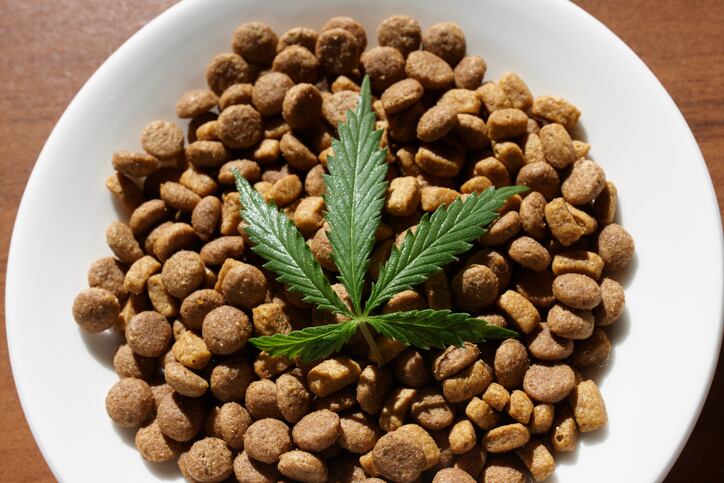Historically pet supplements trends have followed those in products meant for their human masters — and CBD is no exception.
That’s according to Bill Bookout, the president of the National Animal Supplement Council (NASC), the leading trade association representing companies that manufacture and sell products similar to dietary supplements, marketed for dogs, cats and horses.
“The popularity with animals, particularly dogs and cats, has increased more rapidly than I've ever seen the trends follow in any ingredient in the natural products industry. The CBD craze if you will, the demand for CBD, has increased more rapidly in the animal segment than anything I've ever seen. Probiotics bar none. It is following rapidly.”
According to the 2020 Pet Industry Green Paper, almost 75% of current CBD consumers have pets, and nearly a quarter of American pet owners already use CBD for themselves, their pets, or both.
Safety
Regardless of how many legs the end user might have, the number one question with CBD is safety.
“We don't think the data suggests that in the ranges that are commonly utilized for CBD products in dogs or cats that it poses a high risk — provided the company is a responsible company and follows cGMPs, adverse event recording, tests products for contaminants and responsibly participates in the industry,” Bookout said.
Bookout said in his view NASC has the most advanced adverse event reporting system in the supplement industry, whether for humans or animals. An ingredient risk report NASC ran on April 17th 2020 indicated there are 365 pet products containing cannabis or cannabis-derived compounds in the marketplace.
“It has been on the market for 11 years. Specifically in dogs, there have been 123 non-serious adverse events reported. No serious adverse events in over 58 million individual administrations of products containing CBD.”
Bookout said in all species of animals that they track, which is dogs, cats and horses, there have been 131 adverse events reported. However, of the 68.8 million administrations of products containing cannabis and cannabis derivatives including CBD, no serious adverse events were reported.
“I think the preponderance of the data at this time suggests that CBD does not pose a high risk to animals based on the data that we have in our system,” Bookout said.
State by state differences on vets' ability to recommend products
Given the ample amount of data backing the safety of CBD, many are advocating for guidance and reform in CBD pet products.
“CBD and other cannabinoid products have great promise in pets and I have used them for several years to help alleviate pain and anxiety, especially in dogs and some in cats. I have been advocating for more change on the national and state level as a member of the AVMA and the MVMA,” said Jeffrey Powers, DVM, who is also a member of a newly forming Veterinary Cannabinoid Society.
“Many states are grappling with the legality of CBD in pet products, as it is ambiguous in people,” added Powers.
Indeed, the FDA has not approved CBD for any use in animals. The agency recommends pet owners talk with their veterinarians about appropriate treatment options for their pets.
However, not all vets can legally do that. Some states allow veterinarians to discuss but not dispense, and other states won't let them dispense or discuss products with CBD. For humans, physicians in states with legal programs can 'recommend' CBD. It appears that in may cases, getting medical advice on CBD is more difficult for pets.
Whether a veterinarian can recommend CBD is generally left to the state medical and veterinary boards, as long as the physician or veterinarian is not selling the CBD product. As attorney Todd A. Harrison, Venable LLP explains, both boards have a standard of conduct and care that must be adhered to.
“Prescribing CBD for an ailment in which it would not be effective or safe could land those physicians and veterinarians in the crosshairs of the Boards. With that said, I am not aware of medical boards going after physicians, but I am aware that many state veterinarian boards have raised concerns and have consistently stated that it violates the standard of care,” said Harrison, who co-chairs Venable's FDA Group and works extensively in the areas of dietary supplement safety, labeling, and advertising claims.
Bookout pointed to California as an example: “They won't let veterinarians dispense products...you will force an animal owner to go down to a dispensary and talk to some budtender and get a recommendation for a product for their dog or their cat. I don't think that's the responsible approach.”
Efficacy
CBD continues to gain traction as consumers and their pets use it to help with pain, anxiety, insomnia and more.
According to a BDS Analytics Consumer Insights, the top reason people purchase CBD for their pets is to treat or manage a health problem.
“There's no placebo effect in dogs. So you either see a response or you don't, such as a behavioral change or if they're limping and then they don’t limp. So do I think it's beneficial in dogs? Absolutely,” Bookout said.
Looking ahead
Powers highlighted the need for education of veterinarians staff and the general public on cannabis science and medicine. Along those same lines, he would also like to see research and university-level educational programs regarding cannabis in domestic animals.
Additionally, Powers is advocating for veterinarians to be allowed to enter discussions with clients regarding cannabis in veterinary medicine. Lastly, Powers is hoping that one day pharmaceutical-grade cannabis products in veterinary medicine will be available.
The FDA recently stated they are continuing to work on broader CBD regulations that could eventually make way for cannabis products to be legally marketed as dietary supplements or food items.
“We recognize that there is substantial public interest in marketing and accessing CBD for a variety of products. We are working toward a goal of providing additional guidance, and have made substantial progress,” FDA recently said in a statement. “There are many questions to explore regarding the science, safety, effectiveness and quality of products containing CBD, and we need to do our due diligence.”
NASC is also continuing to build the basis for future CBD regulations. Bookout said the association is considering a six-month safety study on dogs and CBD, which is in the discussion phase right now.
“So safety is certainly a concern from FDA and that's a concern on the human side from FDA as well. And so we certainly support more research and safety,” Bookout said.


